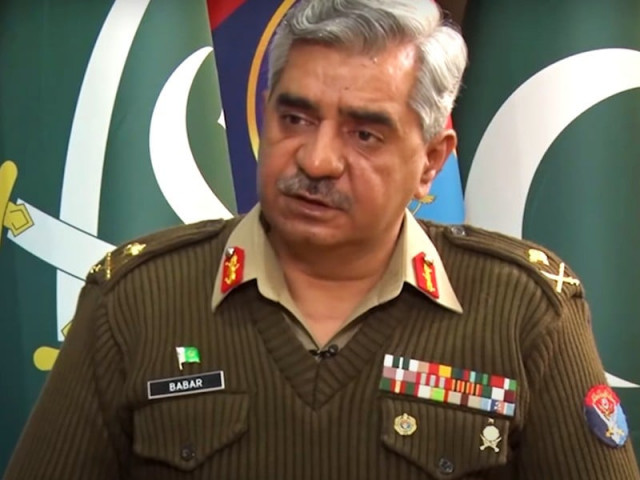Pakistan is only facilitator not guarantor of Afghan peace, says DG ISPR
India moved its spoilers in different directions to blame Pakistan for Afghanistan unrest, says Maj Gen Babar Iftikhar

As foreign forces continue their pullback, Afghanistan appears to be sliding into chaos in the absence of a political settlement among the stakeholders with an on-again, off-again peace process unable to yield anything tangible.
Pakistan, which has played a pivotal role in bringing the Taliban to the negotiating table, says it can only facilitate the Afghan peace process but cannot guarantee its success.
“Pakistan is only a facilitator of the Afghan peace process – not a guarantor,” Maj Gen Babar Iftikhar, the director-general of the Inter-Services Public Relations (ISPR), said in a television interview on Saturday.
“Pakistan has no favourites among the Afghan stakeholders. The Afghans have to choose their leadership. In case of any deadlock, we can assist. Pakistan has made all-out efforts but it cannot go beyond its limits,” he added. “Afghans have the capacity and capability to decide their future course.”
As far as Pakistan is concerned, it has made sincere efforts for an Afghan-led and Afghan-owned peace process, he said.
Read more: Taliban may slip into Pakistan as refugees, warns NSA
The Taliban have made lightning battlefields gains since the US started withdrawing its troops. Taliban officials claimed on Friday that they were in control of 85% of Afghanistan’s territory, though the militia says it doesn’t aspire to take power militarily.
“In the past 20 years, the US military has trained the Afghan National Army which has the strength and capability and its own air force,” Maj Gen Iftikhar said. “Trillions of dollars have been spent on them. And as a professional soldier, I believe they should be able to fight this [Taliban] onslaught as a professional force.”
Surprisingly, the Taliban’s march has mostly been bloodless thus far as in most districts taken over by the militia, government troops surrendered without putting up a fight. “I am surprised by the progress that the Taliban have made and I hope the Afghan forces will find their bearing and push back,” US Special Representative for Afghanistan Zalmay Khalilzad said in a recent interview.
Earlier this month, US troops vacated Bagram airbase — which served as the nerve centre of all US military operations in Afghanistan for two decades — in a move that serves as a precursor to the American exit from the strife-torn country.
Its Nato allies are also pulling out their troops. The withdrawal process would be completed by August 31, while the stakeholders in the region would have to decide the issue in consultation with the Afghan leadership. “We need to understand that it will be Afghans’ own decision – no foreign party will dictate it,” Maj Gen Iftikhar said.
He said all stakeholders favoured a responsible withdrawal of foreign forces which should have happened after a complete political transition in the country.
China accused the US on Friday of rushing to withdraw from Afghanistan and leaving a mess for the region. “The US is eager to withdraw its troops from Afghanistan and leave the mess to the Afghan people and regional countries,” foreign ministry spokesperson Wang Wenbin told a news conference in Beijing.
Maj Gen Iftikhar said the conflict in Afghanistan could not be resolved through use of force because 20 years of foreign military intervention failed to stabilize the volatile situation. He downplayed the ongoing fighting as “just a phase”, saying that the decision about the country’s future would be taken on the negotiation table.
National Security Adviser Moeed Yusuf voiced fears a day earlier that fighting in Afghanistan could trigger an influx of refugees in Pakistan. He also feared that terrorists of the outlawed Tehreek-e-Taliban Pakistan (TTP) could also sneak in posing as refugees.
The military spokesperson endorsed the fears. Like in the past, Pakistan could face the spillover effect of a civil war in Afghanistan, he said. “We were very well aware of that and we have taken several measures to deal with the situation.”
He added that the so-called Khorasan franchise of Islamic State – also known by its Arabic acronym Da’ish – and TTP and its affiliates were using their bases in Afghanistan to orchestrate attacks on Pakistan’s armed forces.
About the possible influx of Afghan refugees, he said that the interior ministry has already put together a contingency plan for this purpose.
Maj Gen Iftikhar said they have strengthened security along the Pak-Afghan border. More than 90% of the 2,611-kilometre-long border has been fenced, while only high altitude or glaciated places are left.
Forts have also been built along the length of the border where new wings of Frontier Corps, especially raised for the purpose, are deployed, he said. “God willing, we should be able to take care of this situation.”
However, he regretted that no serious effort has been made by Afghan or foreign forces on their side of the long frontier to contain terrorist activities against Pakistan. “Our approach has been clear: Pakistan will never let its soil be used against any country,” he added.
Referring to the oversized Indian footprint in Afghanistan, the military spokesperson said Delhi’s investment was aimed at establishing influence in an effort to damage Pakistan’s interests.
“The prevailing situation has caused huge frustration on the Indian side,” he said. “Now, Delhi has moved its spoilers in different directions to blame Pakistan for the unrest in Afghanistan, but the Indian propaganda would not get any traction because the world has realised that Pakistan has made earnest efforts to resolve the Afghan issue according to the aspirations of the local populace.”



















COMMENTS
Comments are moderated and generally will be posted if they are on-topic and not abusive.
For more information, please see our Comments FAQ